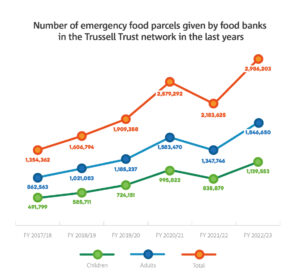In the past 12 months, foodbanks in the Trussell Trust network saw the highest ever levels of demand, even more than during the peak of the pandemic, as more people found their incomes did not cover the cost of essentials like heating and food. Between April 2022 and March 2023, almost 3 million emergency food parcels were distributed by foodbanks, an increase of 37% compared with the same period last year. More than one million of these parcels were distributed for children.
December 2022 was the busiest month on record for foodbanks in the Trussell Trust network, with a food parcel being distributed every 8 seconds.
At North Cotswold Foodbank, we saw an even greater increase in emergency food parcels handed out between April 2022 and March 2023 with almost 1600 food parcels distributed, an increase of 105% compared with the prior year. We fed 4700 people, of which around 2,000 were children.
Kevin Carden, Project Manager for North Cotswold Foodbank, said: “These statistics are extremely concerning. Increasing numbers of people are experiencing financial hardship due to the cost of living crisis and more working people than ever are needing to turn to food banks for support. This is not right.”

In December 2022, the Joseph Rowntree Foundation (JRF) reported that for all low-income households in the bottom 40% of incomes, 7.2 million (62%) were going without essentials. This means that they had reported going hungry or cutting down the size of meals or skipping meals in the last 30 days or going without basics like showers or adequate clothing since June 2022.1
Emma Revie, Chief Executive of the Trussell Trust, said: “The continued increase in emergency food handed out over the last five years indicates that it is ongoing low levels of income and a social security system that isn’t fit for purpose that are forcing more people to access foodbanks.
Foodbanks were set up to provide short-term support to people in an emergency, they are not a lasting solution to hunger and poverty, and more than three quarters of the UK population agree with us that they should not need to exist. For too long people have been going without because social security payments are not based on a real reflection of life’s costs and people are being pushed deeper into hardship as a result. If we are to stop this continued growth and end the need for food banks then the UK government must ensure that the standard allowance of Universal Credit is always enough to cover essential costs such as food, household bills and travel.”
You can read the full article here
- Going under and without: JRF’s cost of living tracker, winter 2022/23 (2022), Joseph Rowntree Foundation. Read the report here
